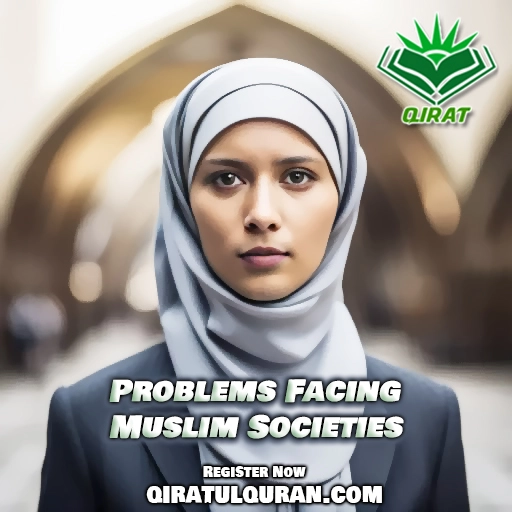Problems Facing Muslim Societies Today: The Qiratul Quran will tell you that Muslim societies around the world face a number of social, political, and economic challenges. Some issues are internal, stemming from conflicts over religious interpretation and practice. Other problems come from outside, such as discrimination and stereotyping in non-Muslim societies. As the global Muslim population continues to grow, finding solutions to these issues is vital for creating stable, prosperous communities.

Social Issues in Islamic Societies
Gender Inequality
Many Islamic societies struggle with gender inequality and lack of women’s rights. Traditional interpretations of Quranic verses and hadith have led to discrimination against women in areas like education, employment, marriage, and inheritance rights. However, other Muslims argue these practices stem from patriarchal cultural traditions, not Islam itself. Increased education and empowerment of women is needed. We need to solve these Problems Facing Muslim Societies today.
Sectarian Violence
There are divisions between Islamic sects, most notably Sunni and Shia. Power struggles and ideological clashes have led to sectarian violence in countries like Iraq, Syria, and Pakistan. This sparks intolerance and threatens stability in Muslim communities. Dialogue and reconciliation between factions is critical.
Social Rigidity
Some conservative Islamic societies impose strict social codes limiting individual freedoms. Moral policing by religious authorities prohibits women from dressing freely, bans alcohol and music, and harshly punishes minor transgressions. This rigidity causes backlash among Muslim youth and liberals seeking reform.
Poverty
Many Muslim-majority countries suffer from economic inequality and lack of social mobility. Poverty makes people vulnerable to problems like drug addiction, human trafficking, and radicalization. Wealth gaps also fuel unrest and demands for political change. More economic development and educational opportunities are needed.
Major Conflicts Within Islam
Sunni-Shia Division
As mentioned, tensions between Sunni and Shia Muslims have led to sectarian conflicts across the Middle East and South Asia. Power struggles in Syria and Iraq have strengthened extremist groups exploiting this divide. The resolution requires addressing political grievances and rebuilding trust.
Reformists vs Traditionalists
Reform-minded Muslims advocate reinterpreting traditional doctrines on gender, politics, and human rights. However, ultraconservative clerics condemn reform as deviant. Debates over the scope of ijtihad (critical reasoning) to modernize Islamic law divide opinion. Progress requires openness from both camps.
Islamism vs Secularism
Many Muslims disagree on the role of religion in governance and society. Islamists favor greater influence of sharia in public life, while secularists want the separation of mosque and state. Debates rage over issues like democracy, women’s rights, and freedom of expression. Moderation is key for coexistence.
Problems Muslims Face Globally
Discrimination and Exclusion
Muslims in many non-Muslim societies face prejudice and social isolation. Bias in education, employment, and housing marginalizes Muslims. Anti-immigrant rhetoric also portrays Muslims as threats. Countering Islamophobia requires outreach to foster local integration.
Vilification and Stereotyping
Negative stereotypes depicting Muslims as terrorists, extremists, and oppressors of women pervade media narratives and public perception. This leads to hate crimes, civil rights violations, and alienation of Muslims. More balanced coverage and positive imaging are necessary.
Surveillance and Profiling
Law enforcement agencies often profile and surveil Muslim communities disproportionately. This erodes trust in authorities and violates privacy rights. Oversight and policy reforms must prevent discrimination in counterterrorism activities. Community outreach can also improve relations.
Restrictions on Religious Practices
Some countries restrict Islamic rituals like hijabs, mosque construction, or halal slaughtering, often under the guise of secularism. However, many Muslims view this as an infringement on religious freedom. Multicultural accommodation of Islamic practices, within reasonable limits, is needed.
Problems for Muslims in Western Countries
United Kingdom
British Muslims face Islamophobia, employment discrimination, educational barriers, and media bias. Many live in low-income isolated communities with high crime rates. Far-right groups have also targeted Muslims. More government effort is required on economic inclusion and anti-hate policies.
United States
American Muslims struggle with religious profiling, mosque vandalism, and harassment. Political rhetoric links Islam to terrorism and portrays Muslims as disloyal. The Muslim community itself wrestles with issues of identity and radicalization of youth. Civic engagement and interfaith dialogue can strengthen pluralism.
Canada
Though less overt than in Europe or America, Canadian Muslims still face barriers to jobs and housing as well as political alienation. Conservative provinces like Quebec have also legislated limits on religious symbols. Going forward, Canada must uphold the values of multiculturalism and religious freedom.
Australia
Racial tensions target Australian Muslims with vandalism, hate speech, and collective blame for terrorism. Media depictions are often inflammatory. Government deradicalization programs have also unfairly targeted the community. Stronger legal protections and positive public education are required.
Islamic Perspectives on Society
Oneness of Allah
The core of Islamic society is the Oneness of God (Tawhid), recognizing Allah as the sole creator, master, and judge. This defines the roles, purpose, and ethics of humanity. Society must be ordered under divine sovereignty.
Comprehensiveness
Islam is holistic, applying faith to all individual and collective affairs – worship, family, politics, law, economics, knowledge, art, and international relations. Societal institutions must reflect Islamic values and teachings.
Brotherhood and Justice
The Islamic social order promotes solidarity, mutual responsibility, and transcendence of tribal or national divisions. Members of the ummah (worldwide Muslim community) share a common identity. Justice and inclusiveness are vital.
The balance between Individual and Society
Islam seeks a middle ground between individual rights and social duties. The well-being of society depends on moral self-discipline, while society must enable the spiritual and material flourishing of individuals and families.
Work and Social Responsibility
Islam encourages enterprise, trade, and wealth creation through work. But profit motives must adhere to moral limits. Wealthy Muslims also have duties to the poor through zakat (charity) and sadaqa (voluntary giving). Society must care for the disadvantaged.
Conclusion on Problems Facing Muslim Societies Today
In summary, Muslim societies face complex challenges spanning social, political, and economic spheres. However, resources within Islamic tradition can provide solutions if creatively applied in a progressive manner. Additionally, Muslims and non-Muslims must work together constructively through dialogue, policy reform, and public education to overcome misunderstandings and create an inclusive world order. The future of Muslim societies depends on it.





